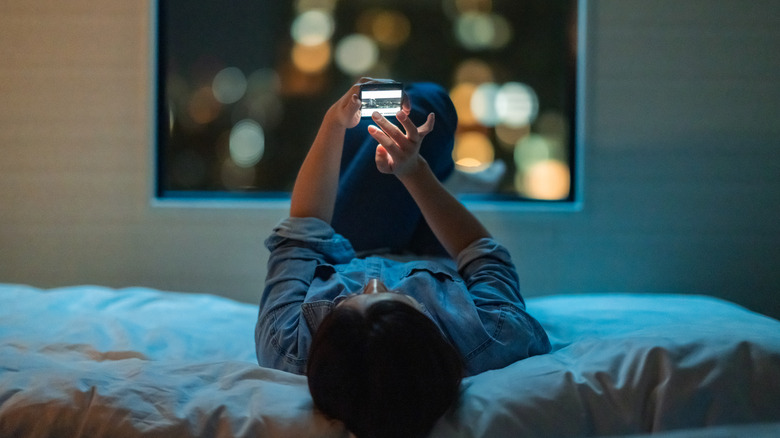Is It Bad To Sleep Near Your WiFi Router? Here's What We Know
When you live in this modern world, you can't seem to go a day without someone telling you about how something is bad for you. Your phone's blue light is keeping you up at night, which is why you should never sleep with your phone near your bed. You should be wary of pretty much everything you buy at the store. You should always wear SPF to protect yourself from the sun. And so on.
You may have also heard about how sleeping near your WiFi router could be bad for your health and sleep. As it turns out, there is actually some science behind this claim, mainly revolving around the electromagnetic fields (EMF) emitted from this device and other gadgets like microwaves, cellphones, hair dryers, computers, and laptops (per Healthline). EMFs can be man-made or natural (think of the sun and its UV radiation). While some researchers believe that low-frequency EMFs, like those emitted by a WiFi router and cellphone, are not dangerous, others argue that long-term exposure can lead to sleep disruption, mood changes, cognitive problems, and even cancer.
"Radiofrequency signals [a type of EMF] transmitted by routers can negatively affect sleep quality, potentially leading to headaches or fatigue," according to Isabella Gordan, a certified sleep science coach and co-founder and editor-in-chief of Sleep Society (via Homes & Gardens). But is there any truth to this claim?
The connection between WiFi routers and melatonin
The topic of how EMF exposure really affects your health is an ongoing area of research. While most of us have heard of the dangers of exposing ourselves to high-frequency ionizing radiation (e.g., x-rays and CT scans), we don't know much about the low-frequency non-ionizing type, which is where WiFi routers come in. The International Agency for Research on Cancer (IARC) lists non-ionizing EMFs as a possible human carcinogen. Chronic diseases such as cancer could be a result of continued exposure to EMFs, per Psychology Today.
According to environmental scientist Una Phelan, who's been studying the damaging effects of long-term EMF exposure, there is a direct link between EMFs and disruption of melatonin production (per Econscious Living). While we may have heard that visible light emissions from our household devices like smartphones and tablets hinder the signals telling our brain to produce the sleep hormone melatonin, there are also invisible signals that do the same thing. WiFi routers emit such invisible rays. "The result is poor quality sleep which can include delayed entrance into a deep sleep and reduced time spent in certain sleep stages," explained Phelan.
Sleep quality and hormone disruption aren't the only concerns here, though. Prolonged EMF exposure has also been linked with anxiety, depression, and stress, according to a 2018 study published in Electromagnetic Biology and Medicine. What does this mean for those of us who sleep near a WiFi router?
The benefits of disconnecting before bedtime
At the very least, the topic of whether or not your WiFi router could be ruining your sleep is likely to be enough motivation to unplug from all devices before bedtime. It also wouldn't hurt to make sure your internet device is located somewhere other than in your bedroom.
As for switching off your router at night, experts seem divided on whether or not this is a bad idea. According to Nick Hunn, chief technology officer at wireless consultancy WiFore (via The Sun), turning off your router daily can negatively affect your connection speed. "You're more likely to have a slower connection with things buffering. Because it is slower, you use more power, which increases the consumption," shared Hunn. On the other hand, Jez North Web CEO Jeremy Dawes feels differently (via Homes & Gardens). "Turning off your WiFi can reduce energy consumption, minimize security risks, and reduce interference with other networks."
The benefits of switching off technology before bedtime have been talked about a lot. You can give your mind time to unwind after a long day, you can engage in sleep-healthy exercises like deep breathing, and you can prevent the urge to switch on Netflix in the middle of the night if your WiFi router is turned off. Perhaps this can be the takeaway from concerns like these, at least until more research is done.



